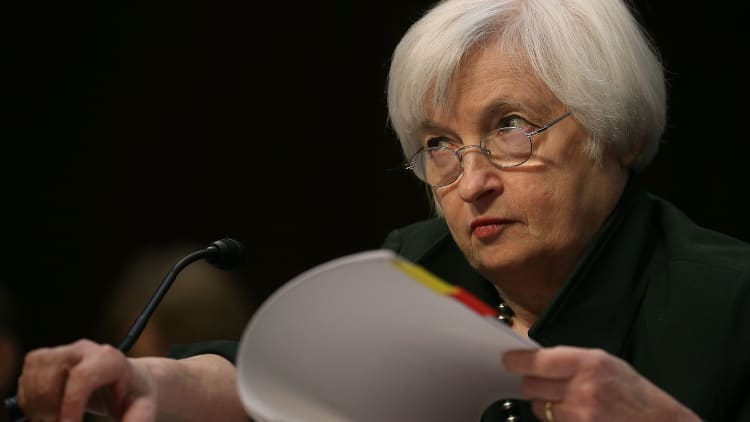
The Federal Reserve voted Wednesday not to raise its key interest rate, as central bank officials expressed concern with the pace of economic growth.
In a move largely expected in financial markets, the policymaking Federal Open Market Committee unanimously agreed to keep its benchmark rate target at 0.75 percent to 1 percent. The rate is used as a guide for a variety of consumer debt instruments such as credit cards and adjustable-rate loans.
The accompanying statement showed some misgivings about an economy that grew just 0.7 percent in the first quarter.
Adjustments from previous statements indicated that Fed officials judged at this week's two-day meeting that "economic activity slowed" while "household spending rose only modestly."
While
The Fed, however, noted that it believes the weakness won't last, and gave no indication that it would alter its intentions to raise rates in the future.
"The language was just really to acknowledge some of the slowdown and weakness that has been seen, but also to send the message that it's not enough to deter them from their plans," said Craig Bishop, lead fixed income strategist at RBC Wealth Management. "June is on the table" for the next rate hike.
The language broadly runs counter to recent communication from Fed officials, who at the March meeting expressed
The statement did say it expected the
"The Committee views the slowing in growth during the first quarter as likely to be transitory and continues to expect that, with gradual adjustments in the stance of monetary policy, economic activity will expand at a moderate pace, labor market conditions will strengthen somewhat further, and inflation will stabilize around 2 percent over the medium term," the statement said.
President Donald Trump entered office in January on a pro-growth platform that has since stalled in Congress. Administration officials have expressed hope to get tax cuts approved before the end of the year, but no infrastructure spending program has been put forth. Congress has found itself preoccupied for much of the year with unsuccessful efforts to repeal the Affordable Care
Trump administration officials believe that implementation of his plans would boost GDP growth to the 3 percent to 4 percent range.
The Fed has raised rates twice since the election, the most recent in March, and is expected to approve another hike in June. Traders in the fed funds futures market are anticipating a 70 percent chance of a move at the next meeting, but are split on whether the Fed will raise again this year.
In projections released in March, Fed officials indicated two more hikes are on the way, while the futures market believes there's about a coin-flip chance of that happening. Wednesday's statement repeated
The statement also did indicate that business investment has "firmed." Indeed, last week's initial read on first-quarter GDP growth showed that to be one of the bright points, with nonresidential investment growing at a double-digit or better pace.
The FOMC did not address an issue of increasing concern in the market –
However, officials have not set forth a plan
This is a breaking news story. Check back here for updates.
Watch: Pros say market ready for more rate hikes



